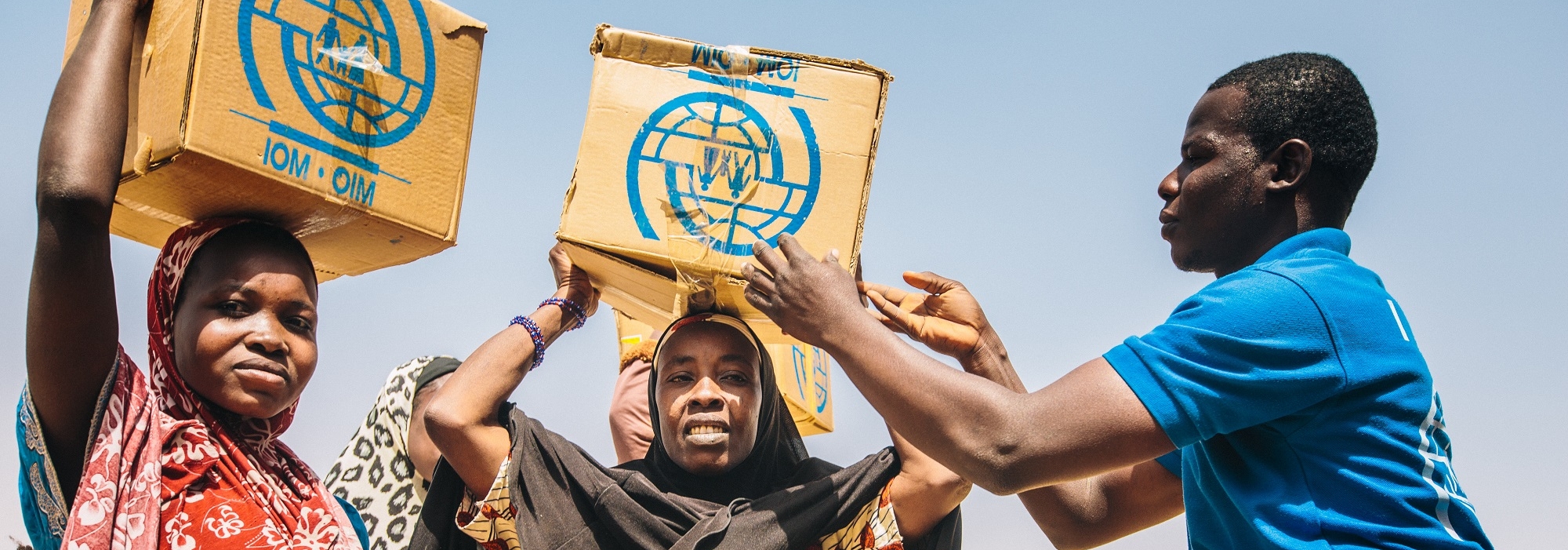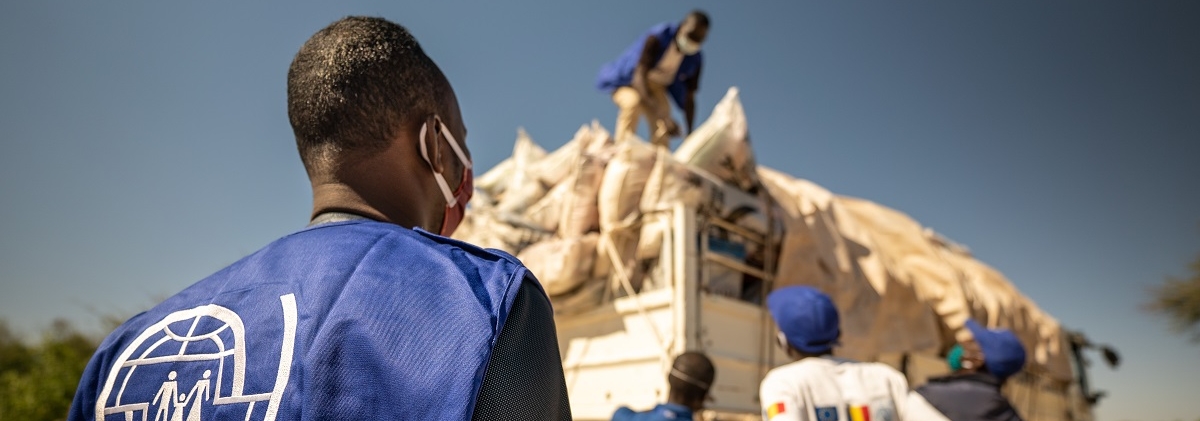IOM Vision
IOM’s engagement in the four riparian states of the Lake Chad Basin, namely Cameroon, Chad, Niger and Nigeria, directly supports the Lake Chad Basin Commission (LCBC), central and local level authorities in interventions spanning across the humanitarian-development-peace nexus. In alignment with the LCBC’s Regional Strategy for the Stabilization, Recovery, and Resilience of the Boko Haram-Affected Areas of the Lake Chad Basin Region, IOM supports the LCBC and its Member States to provide humanitarian assistance to displaced populations, prevent and reduce conflict drivers, and support the attainment of durable solutions for conflict-affected populations.
Objective
Saving lives and protecting people on the move
In order to alleviate the suffering of conflict-affected populations, and ensure lifesaving humanitarian needs are met, IOM assists internally displaced persons (IDP), refugees and host communities in areas of displacement throughout the Lake Chad Basin region.
IOM will continue to provide tailored shelter/non-food item (NFI) assistance to the most vulnerable IDPs displaced by the Lake Chad Basin crisis to address urgent needs and alleviate suffering, including through:
-
Distribution of NFI and emergency shelter kits;
-
Maintenance of shelters in camp settings;
-
Provision of transitional shelter solutions;
-
Rehabilitation of shelter for host and displaced communities in out of camp settings;
-
Host community support through cash interventions;
Interventions will be in line with the Shelter/NFI cluster guidelines in all four affected countries, and the targeted populations (IDPs in sites, collective centres, in host communities) will be selected through transparent processes adapted to the local context and relevant vulnerability criteria.
Following IOM’s Manual on Community-Based Mental and Psychosocial Health Support in Emergencies and Displacement, the Organization will target displaced and host communities affected by the Lake Chad Basin crisis. This will include:
-
Mental health and psychosocial support (MHPSS) assessments to identify the available resources, approaches, and key stakeholders in affected areas;
-
Implementation of individual and group mental health and psychosocial support activities in target communities with interdisciplinary teams (art-based, sports and play, socio-cultural) to address psychosocial needs and strengthen community networks, as well as to aid victims of gender-based violence;
-
Strengthening local capacities to carry out community-based MHPSS activities ensuring sustainability for the future;
-
Conducting training for local stakeholders on the provision of psychological first aid (PFA);
-
Creation of resource centres and safe spaces for community members;
-
Deployment of psychosocial mobile teams, referral teams and community animators in displacement areas;
-
Coordination with Ministries of Health for the deployment of psychiatric nurses where service gaps exist.
IOM will continue to ensure that standards and procedures are followed, responses are coordinated, and that a common understanding is established among MHPSS response partners on MHPSS concepts and terms, principles and models of work, community-based approaches and information sharing, while respectful of IOM’s Data Protection principles.
IOM will continue to provide safe access to high quality, timely and adequate water, sanitation and hygiene services in Borno, Yobe and Adamawa states in Nigeria, as well as in the Diffa region in Niger. This will include ensuring:
-
Adequate and safe access to potable water;
-
Safe, dignified, and adequate excreta management (sanitation);
-
Access to sufficient quality personal hygiene items, including menstrual hygiene management (MHM);
-
Adequate, dignified, and comprehensible hygiene promotion;
-
Solid waste management;
-
Environmental hygiene and flood mitigation through the construction and maintenance of drainage and environment protection education;
-
Construction of household latrines in support of the e-shelters provided;
-
Gender-segregated communal latrines in schools, hospitals and other public spaces;
-
COVID-19 sensitization campaigns.
-
Support to WASH in health facilities within the camps.
Priority areas of intervention include camps particularly over congested-camps and camps with low accessibility of WASH services, camp-like sites, hosting communities around settlements without WASH services, and reception centres.
IOM will continue to work with the Ministries of Health and health sector partners in Chad, Niger and Nigeria to provide systematic approaches to enhancing healthcare provision across camp and camp-like settings. This will include:
-
Prevention and control of epidemic-prone diseases, especially in camp settings;
-
Support for the provision of life-saving primary health care services to the vulnerable population;
-
Preparedness and response including mass vaccination and routine expanded Programme on Immunization (EPI), capacity building of health professionals, to contribute to health systems strengthening, health information management;
-
Emergency referral and support systems.
IOM supports its Member States to augment national and local capacity to mitigate protection and gender-based violence concerns, including through:
-
Capacity building of government, local authorities, security forces, and community members involved in the protection of crisis-affected populations on topics including but not limited to child protection, gender-based violence, protection mainstreaming, and trafficking in persons;
-
Direct assistance to survivors of gender-based violence, and reinforcement of effective referral mechanisms;
-
Support to vulnerable women and girls with gender-specific NFI kits, and support to school-aged children with education and NFI kits;
-
Support to protection committees with appropriate tools to enhance community-based protection structures;
-
Conducting participatory community assessments on the safest places for women and girls within the community and creating safe spaces in selected communities;
-
Conducting sensitization campaigns to raise awareness on existing protection risks, available referral mechanisms, and resources.

Objective
Driving solutions to displacement
Recognizing that IDPs and refugees are beginning to return to areas of origin and the need to support localized efforts to transition back into normalcy and attain durable solutions, IOM supports humanitarian, recovery, and governance efforts in areas of displacement and return of conflict-affected persons, including returnees, IDPs seeking shelter in newly-safe areas and communities who stayed behind.
IOM engages its Member States at national and local levels to contribute to the recovery and resilience-building of conflict-affected populations throughout the Lake Chad Basin through community stabilization interventions in order to enhance stability and security, restore access to effective local governance structures and mechanisms, rebuild trust and social cohesion among community members, vulnerable populations and local authorities, and lay the foundations for durable solutions, lasting peace and sustainable development.
Aligned with the objectives of the Lake Chad Basin Commission’s Regional Strategy for the Stabilization, Recovery, and Resilience of the Boko Haram-Affected Areas of the Lake Chad Basin Region, IOM’s approach to reinforcing stability engages conflict-affected communities and local authorities in transparent, participatory processes to jointly and constructively discuss community grievances, and identify solutions contributing to local recovery and social cohesion. In doing so, IOM employs a two-pronged approach:
- Supporting communities in addressing root causes of instability by addressing drivers identified through consultative decision-making processes and supporting its Member States in Cameroon, Chad, Niger and Nigeria to rapidly respond to community priorities
- Based on the outcomes of these locally-driven prioritization exercises, IOM then engages communities and authorities to implement the solutions and way forward identified, including support to infrastructural rehabilitation, livelihoods support, civil society engagement, among many other possible responses, to maintain the positive momentum of constructive collaboration and contribute to lasting recovery and peace.
As displaced populations continue to return to their places of origin, there is urgent and significant need to support recovery efforts, and build community resilience to address the factors which drove displacement. Informed by its DTM Stability Index, and applying the principles from its Framework on the Progressive Resolution of Displacement Situations, IOM operates in areas of return deemed poised for longer-term sustainable recovery by working to:
-
Improve access to basic social services;
-
Restore critical infrastructure;
-
Promote socio-economic recovery, including through support to social cohesion, local governance restoration, and through renewing access to livelihoods and economic opportunities.
Aligned with the objectives of the Lake Chad Basin Commission’s Regional Strategy for the Stabilization, Recovery, and Resilience of the Boko Haram-Affected Areas of the Lake Chad Basin Region, IOM will:
- Continue its support to the governments of Cameroon, Chad, Niger and Nigeria to create environments conducive to the restoration of peace in areas affected by Non-State Armed Group Violence, through support to peacebuilding and social cohesion interventions seeking to reinforce the fragile social fabric and reduce risk of conflict resurgence in areas of displacement and return.
Objective
Contribute to an evidence-based and efficient crisis response system
Actors engaged in the Lake Chad Basin crisis response across the humanitarian-development-peace nexus.
IOM’s Displacement Tracking Matrix (DTM) continues to serve as a critical data source on displacements across the Lake Chad Basin for governments, and national and international partners alike. Through regular collection, analysis and dissemination of data on displacements, the DTM continues providing key stakeholders with an essential understanding of population movements, trends over time, and the evolving needs of conflict-affected populations across the Lake Chad Basin. Across the Lake Chad Basin countries, IOM supports collective evidence-based decision-making through its implementation of the following data collection exercises:
-
Displacement Monitoring: Tracking and monitoring displacement, including gender and age disaggregation, service delivery, and key needs and gaps across communities;
-
Emergency Tracking Tool (ETT): Reinforcement of monitoring and first alert mechanisms in situations of spontaneous large-scale displacements, enabling rapid referral and rapid paper registrations;
-
Return Intention Surveys (RIS): Providing an understanding over time of IDP intentions and priority concerns promoting or preventing return, thereby informing Durable Solutions planning;
-
Village assessment surveys (VAS): Providing baseline data on needs and gaps in areas of interest to support area-based programming and enabling adapted planning, coordination and targeting of transition and recovery activities;
-
Stability Index: IOM supports policy-making and early recovery planning through its Stability Index, which allows monitoring of stability in return areas and identifying areas with pockets of stability that are primed to return and reintegration activities for conflict-affected communities, enabling partners to better develop strategies and plan operations for interventions that integrate humanitarian, recovery and stabilization components.
-
Points of Entry: IOM's effort to track the impact of COVID-19 in human mobility spans across key monitoring initiatives, including on international travel restrictions, mobility and points of entry, and impacts on migrants, IDPs, and flows. Data collection will continue across the Lake Chad Basin to address specific needs faced by migrants and mobile populations.
Ad hoc tools, such as biometric registration to ensure delivery assistance is effective, also continue to be deployed as needed in areas of displacement. In order to ensure greater support to the Lake Chad Basin Commission in its efforts across the humanitarian-development nexus to address needs and end displacement, IOM will further engage with governmental counterparts to ensure capacity transfer and appropriation on specific data collection activities will be conducted for several years in the Lake Chad Basin region.
Nigeria, Niger, Cameroon, Chad
The map used here is for illustration purposes only. Names and boundaries do not imply official endorsement or acceptance by IOM.
Figures are as of 31 December 2023. For more details of IOM's operational capacity in country, please see the IOM Capacity section.








